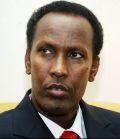Somali leaders call for peacekeepers despite doubts
By Mohammed Ali Bile
 BOSASO, Somalia, Feb 28 (Reuters) – Somalia’s transitional government pledged to stick to its call for African and Arab peacekeepers on Monday, despite opposition from key warlords opposed to the presence of foreign forces.
BOSASO, Somalia, Feb 28 (Reuters) – Somalia’s transitional government pledged to stick to its call for African and Arab peacekeepers on Monday, despite opposition from key warlords opposed to the presence of foreign forces.
The call from Somalia’s new government, formed after talks in neighbouring Kenya in November, has angered some Somalis who particularly resent the idea of deploying troops from neighbouring Ethiopia, long seen as a foe.
Prime Minister Mohamed Ali Gedi said his transitional government would accept troops from the African Union, including Ethiopia — one of the so-called frontline states that border Somalia — despite doubts among many Somalis.
“We don’t want to draw a distinction between the various African countries and their forces, we need their support,” he told some 30,000 Somalis gathered in a football stadium in the northern port town of Bosaso. “It’s not necessary to draw a distinction between the frontline states and other states.”
“Our government requested them to assist in the disarmament programmes,” he said.
Gedi was speaking alongside new Somali President Abdullahi Yusuf on the latest leg of their first meet-the-people tour since the government was formed after lengthy talks in Kenya.
Yusuf urged Somalis to support the new government’s call for the Horn of Africa country’s many militia groups to disarm, saying it was the only way to restore stability after 14 years of civil strife.
“We requested the Somali people to disarm, and the militia and the people and the armed people must support this, in order to achieve peace and absolute stability,” said Yusuf, speaking alongside members of a 40-strong delegation of new ministers and members of parliament.
Earlier this month warlord Osman Ali Ato urged Somalis to attack any foreign peacekeeping troops being sent to support the Somali government, while thousands of people have staged demonstrations in Mogadishu to protest at the idea.
Up to three people were killed and nine wounded on Monday in an outburst of fighting between rival militias in Mogadishu, hospital sources said.
It was not immediately clear why hardline Islamic gunmen were fighting militia loyal to the new government, in a clash that illustrates the volatile climate in Somalia.
Although Yusuf wants a combined AU-Arab League force of 7,500 troops to help the government’s return, ministers from Mogadishu have argued — mostly privately — that local militias alone can guarantee security.
Somalis usually resist interference — the last peace mission there ended in a bloody and humiliating withdrawal by U.S. and U.N. troops in the mid-1990s — although many support the new government’s plan to restore stability.
“We want a good government that can handle the security of the people and their property,” said Zaynab Abdi, a Somali woman who turned out to greet their new leaders.
“It is the first time that I saw a national president of Somalia and I’m happy,” said Sirad Abdi Yusuf, another member of the crowd.
